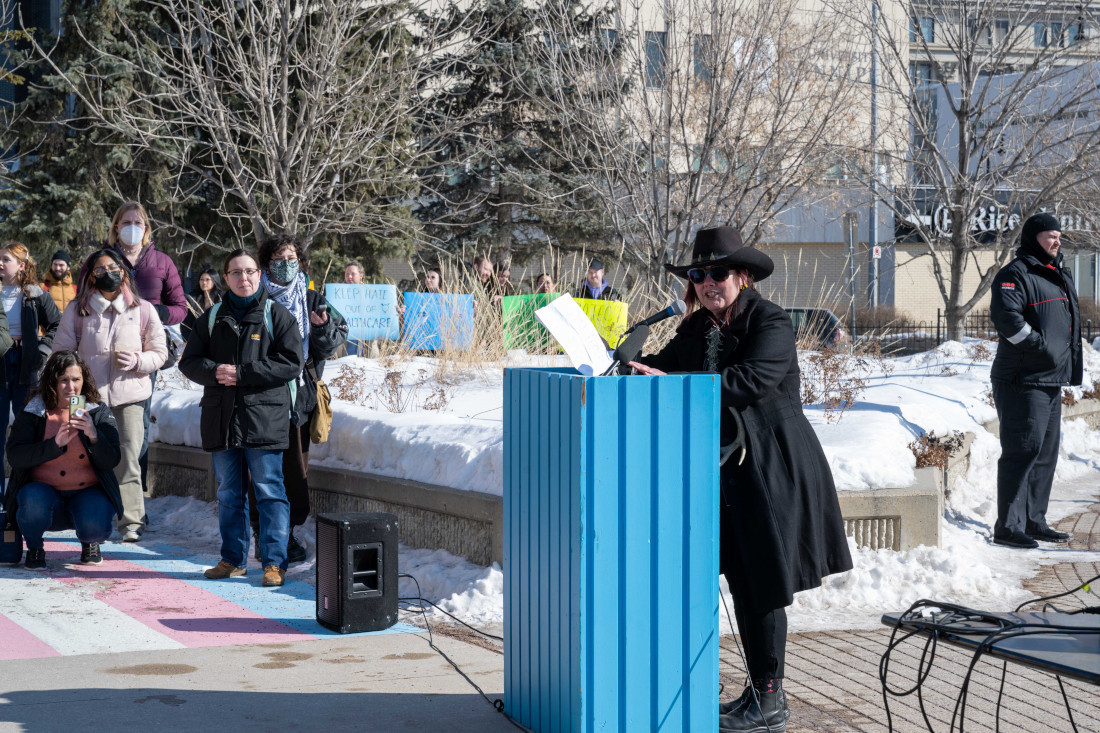Academic freedom and anti-trans rhetoric
Lecture by U of W poli-sci professor sparks community concerns
On March 3, Joanne Boucher, political science professor at the University of Winnipeg (U of W), gave a lecture titled “The Commodification of the Human Body: The Case of Transgender Identities.” The language used on promotional flyers to outline the aims of her lecture, such as the term “transgenderism” and the “economic interests involved” in gender-affirming healthcare, signalled potential anti-trans themes. The circulation of Boucher’s abstract prior to the event garnered backlash from both university students and staff, and the queer community at large.
Emma Joyal, a fourth-year U of W student, started a petition urging the university to cancel the talk, due to its potential to threaten the school’s purported respectful and inclusive learning environment and circulate misinformation about trans lives and experiences.
Alyson Brickey, an assistant English professor at the U of W, led a Trans Love Cupcake Hour, and Brie Villeneuve organized a rally. Organizers scheduled these events at the same time as Boucher’s lecture, and both counter-events were attended by those wanting to show their support of the trans community.
A day before the lecture was due to occur, the university published an email stating that it would not intervene or attempt to cancel the event. By way of explanation, it cited its commitment to academic freedom and its commitment to “fostering an environment in which freedom exists to question and discuss issues using a scholarly and respectful approach.”
Brickey, in an email to The Uniter, defines academic freedom as “a fundamental privilege that academics earn by becoming trustworthy experts in their chosen field.”
She adds that this freedom “protects our right to engage in intellectual critique without the fear of losing our jobs or being unfairly disciplined by the university.”
Brickey emphasizes that “academic freedom is not the same as unbridled free speech. It does not give professors free rein to say anything they like without consequence.”
She quotes clause 7.02 of the collective agreement between the university and those teaching, which states that “academic freedom implies a respect for the rights of others, a tolerance of other points of view and a duty to use that freedom in a responsible manner.”
However, the appropriation of this term by the far-right furthers an increasingly altered understanding of what academic freedom means. Whose academic freedom comes first, and at what cost?
Peter Ives, a political-science professor at the U of W, says that when it comes to opposing freedoms, scholarly responsibility must come first.
“I think in general, people have thought about this issue and this particular talk on campus as if it were a question of free expression, and was this hate speech or not,” he says. “I think that's a misunderstanding of academic freedom.”
“The direction of research ethics for the last 20 years has been saying that if we’re working on research topics, that people are a part of our topics, then we have a lot of responsibility to them,” Ives says.
Brickey adds that, in recent years, there has been a rise in academic freedom used “as a protective cloak” to engage in homophobic, racist and otherwise discriminatory behaviour.
“These instances weaken the principle of academic freedom because they represent a failure to uphold the duty that academics have to use our privilege responsibly,” Brickey says.
She says the ability to disagree with responsible academic work does not mean the right to restrict it. Academic freedom does include the right to debate and discuss research.
Villeneuve, 2SLGBTQ* students’ director for the University of Winnipeg Students’ Association, says that Boucher’s claims reflect anti-trans rhetoric.
Villeneuve adds that if criticism is restricted, academic freedom comes into question.
“Trans people are people. The healthcare we get is affirming to our gender,” Villeneuve says. “Academic freedom does not protect you from others critiquing what you've researched.”
Published in Volume 77, Number 22 of The Uniter (March 16, 2023)


